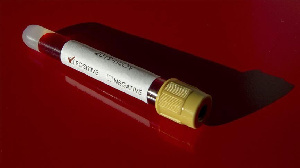 Ghana is working to develop its own COVID-19 RNA rapid test kits
Ghana is working to develop its own COVID-19 RNA rapid test kits
GIZ-Ghana working in partnership with MakerSpace, Kwame Nkrumah University of Science and Technology (KNUST) and other partners have launched a project in Kumasi, to commence the production of COVID-19 RNA rapid test kits.
The project dubbed “Development and Production of Covid-19 RNA Rapid Tests and Strengthening of Local Laboratory Capacities,” aims to enhance the response in dealing with the novel coronavirus pandemic.
This would be achieved through local production of simple, sensitive, rapid, scalable, and affordable test kits for detecting Covid-19 infection.
Ms Anna Voellmecke, representing the GIZ ‘develoPPP’ Team Leader, said the project would not only increase testing capacity, reduce dependency on imports and deepen local self-reliance, but also build local capacity to produce rapid, affordable, and easy-to-use test kits in Ghana.
According to her, the pandemic still posed a threat to humanity.
Therefore, it was important to make sure reliable COVID- 19 prevention, detection, and response protocols existed, she observed.
Ms. Voellmecke pointed out that whilst specialized laboratories played a crucial role in the detection of Covid-19 infections, as well as disease surveillance and control, access to diagnostic testing sites remained a challenge in Africa.
Hence more was needed to expand testing and make it easily accessible and affordable to those who required it.
Ms Voellmecke said the project, which is expected to be co-implemented by the GIZ Ghana’s ‘develoPPP’ programme, and MakerSpace, a community of African Makerspaces, had received funding from the German Federal Government.
It, amongst others, seeks to decrease the dependency on expensive and scarce imported kits, especially during pandemics.
According to the project concept, the use of the method based on the reverse transcription loop-mediated isothermal (RT-LAMP) reaction, would allow for affordable production of the substances needed for these chemical reactions in the diagnostic tests (reagents and enzymes).
This method (RT-LAMP) can be modified and adapted for other emerging and re-emerging diseases without the need to import kits and chemicals
The partners later presented a mobile lab to KNUST, which was received by Professor Christian Agyare, Provost of the College of Health Sciences.